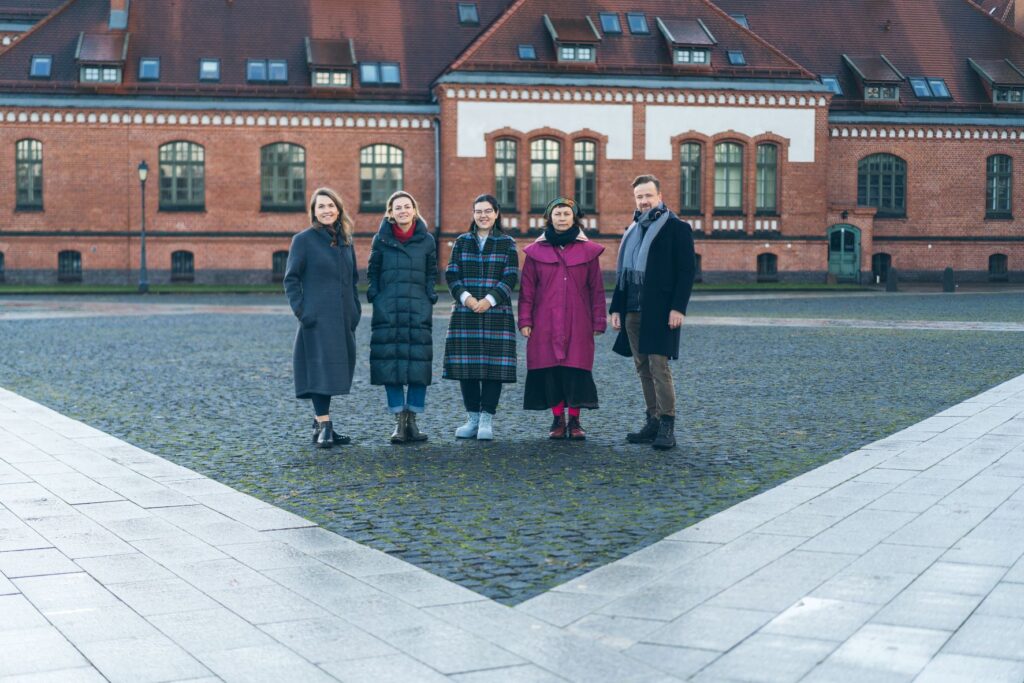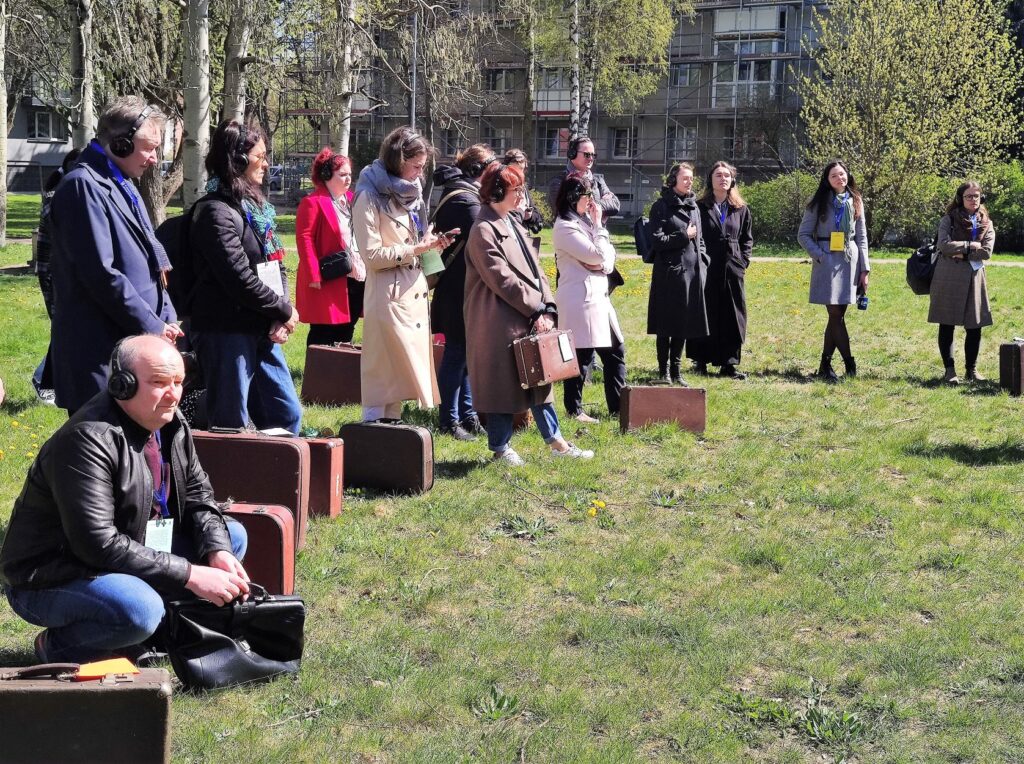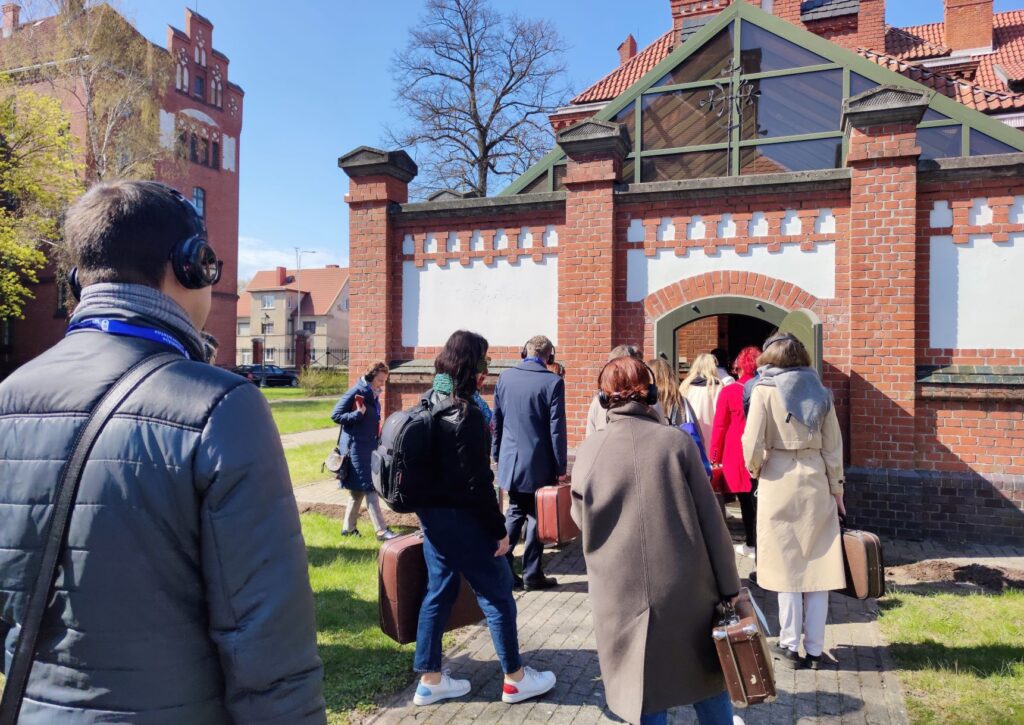The opportunity to stand in someone else’s shoes
A Migrant is not an ordinary tour; it is an experience tour through time. There will be no passive observers; all the participants in the project will become actors, “carrying” in their suitcases their new identity, the story of an unknown person, the feeling of longing for home, and an effort to survive among strangers. The stories of the characters are varied and not always comfortable, and the silent barracks buildings are reminiscent of the time when they were inhabited by German, French, Lithuanian, or Soviet soldiers, waving the flags of peace or war. It was the reflective Swedish method of Time Travel that inspired the researchers of the BRIAI to talk to the public about the past, the war, and people’s experiences in a different manner. However, they modified it in their own way: they found some sound solutions through the use of individual headphones. The participants will hear music, written especially for this project, that conveys the particular periods of time and the stories of migrants.
A journey through the periods of Klaipėda’s history
It was not by chance that the old Klaipėda barracks, the present KU campus, were chosen for the story of the migrant crossroads. Not only do they serve as a military object, but they also embody the state of war that predetermined the reasons for people’s
migration, settlement, or retreat to a safe place. During the tour, its participants will stop at different periods of time: the construction of the barracks in the early twentieth century, the French period, the circumstances of the formation of the Lithuanian armed forces, the moods of the Second World War, the stories of the ‘wolf children’, deportations, the experiences of new settlers who came to Klaipėda after the war, the cleaning of the remnants of St. John’s Church and the city from ruins, and the construction of new houses. The participants will hear about the Sąjūdis time and the transformation of the barracks into Klaipėda University, which has become a place of peace and reflection.
Contributions of famous creators of Klaipėda
The university campus, located away from the city’s cultural objects concentrated in the Old City, often gives tourists the impression of a closed area, which, according to the creative team, they wanted to transform. Representatives of the KU BRIAI team who initiated the project – dr. Raimonda Nabažaitė, Milda Kontrimė and Rima Čerapė – said that, after the discussions, they understood that the academic core alone would not suffice for this experience tour. Thus, a well-known author and scenarist Sondra Simana and sound director Kristijonas Lučinskas joined the creative team. Project leader dr. Raimonda Nabažaitė has already collaborated with them in the Traveling Churches project of Šeiko Dance Theatre. This time, the creative team was tasked with putting the Swedish Time Travel method into practice.
Stories recorded in various dialects and languages
In addition to the creative group, more than six dozen residents of Klaipėda Region and Western Lithuania contributed to the implementation of this project. Some recorded the stories of migrants, while others donated old suitcases. The linguistic and cultural diversity of the region was conveyed by the Italians, French, Ukrainians, Germans, Russians, Jews, Dzūkai, Žemaitians, Aukštaitians, and Lietuvninkai, either living in Klaipėda or staying here for a short time. The professional fields of the narrators are also diverse: those are teachers, pupils, researchers, entrepreneurs, people in the entertainment world, officers, medical people, museologists, composers, and scenarists. Mikalojus Urbonas, professional actor of Klaipėda Drama Theatre, recorded the main text. Symbolically, the old suitcases donated by the population acquired a second life during this migrant tour.
The Migrant Route opens in May
All those interested will be able to follow the migrant route from May. Ticket sales for the tours on May 8 at 3 p.m., May 11 at 6 p.m., and May 22 at 3 p.m. have already been announced. You can find more information about the planned tour times on the Facebook page Migrants, and tickets will be sold on the platform www.bilietai.lt. The project developers recommend planning two hours for this experience and ask you not to be late for the tour start briefing. The meeting point is Klaipėda University Square (Herkaus Manto St. 84), at the building with a clock.
 |
 |
 |







